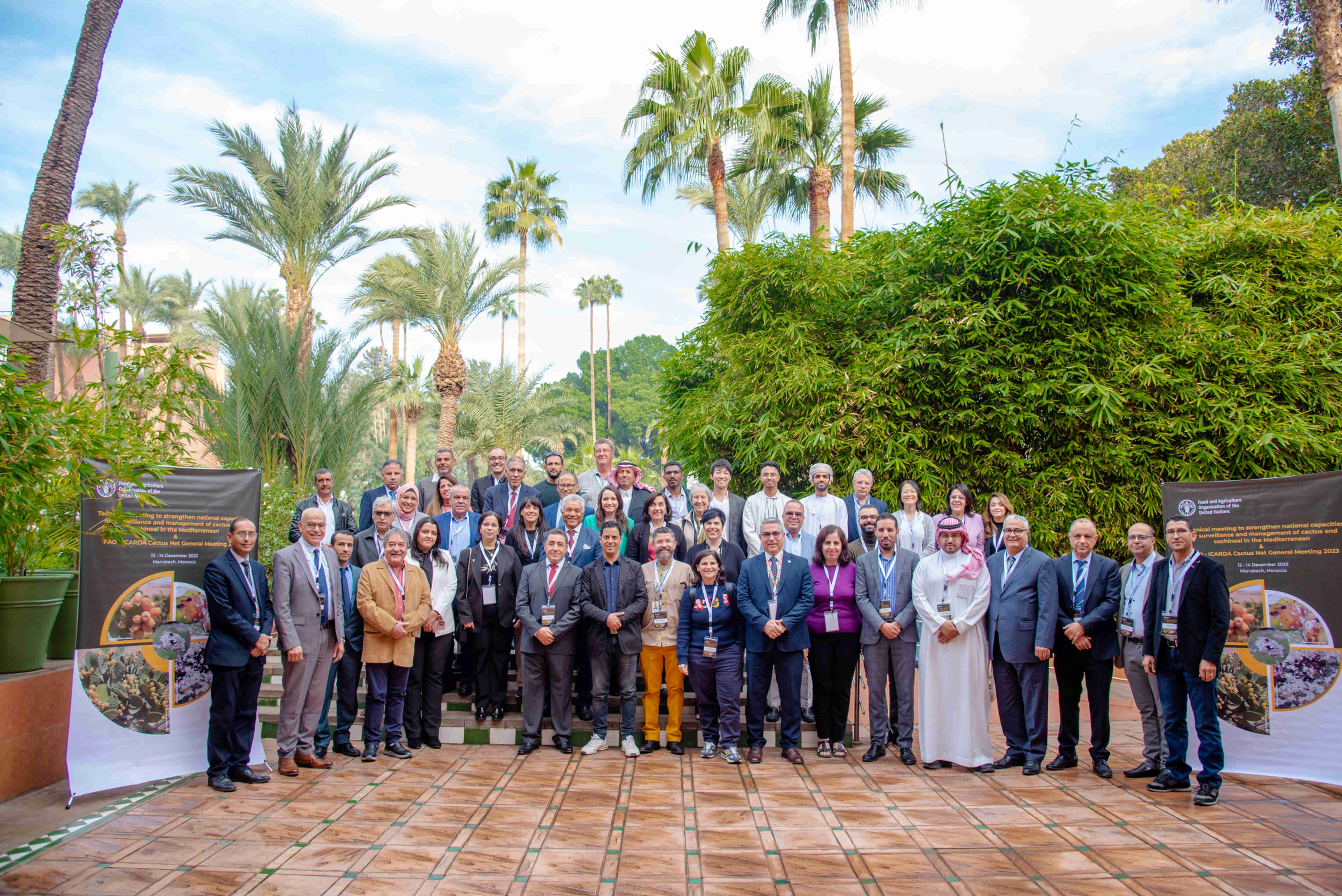FAO strengthens national capacities to surveillance and manage cactus cochineal in the Mediterranean.

©FAO
December 12-14, 2023 - FAO organized the technical meeting to strengthen national capacities for surveillance and managing the cactus cochineal in the Mediterranean region, as well as the general meeting of the FAO-ICARDA International Technical Network on Cactus (CactusNet) in Marrakesh, Morocco, in cooperation with the Ministry of Agriculture, Maritime Fisheries, Rural Development and Water and forests, Morocco, and the Mohammed VI Polytechnic University.
With the growing threat of cochineal in the Near East and North Africa (NENA) region and its significant threat to livelihoods, greater collaboration is needed to combat and contain the spread of the pest. A recent report by FAO (2022) on the status of Cochineal and Opuntia spp. in the NENARegion developed a NENA strategy and a road map for future actions to control the cactus cochineal in the region.
The cactus cochineal is one of the most dangerous invasive pests that has left a trail of devastation on livelihoods and rural farms in the past decade. The insect infected 100,000 ha of cactus pear in Brazil and caused losses of USD 100 million as well as economic and social problems for rural communities. Its presence has been reported in the NENA region in Lebanon (2012), Palestine (2013), Morocco (2014), Syria (2018), Jordan (2018), and recently in Tunisia (2021). “Due to its rapid spread, it poses a threat to the rest of the Mashreq and Maghreb countries.” said Thaer Yaseen, the Regional Plant Protection Officer at FAORNE. He added that national strategies for the IPM of cactus in the region are still limited due to farmers' lack of awareness and that the use of biological control and resistant varieties is still under research. Mr Yaseen emphasized FAO's commitment to supporting and strengthening the national capacities to combat the threat of cactus cochineal in the NENA region.
In his opening speech, Mr Abdelaziz Bousraf, Regional Director at the Ministry of Agriculture, stated that within the framework of the Green Morocco Plan, Morocco implemented several projects for agriculture development, which contributed to increasing the technical capabilities of farmers and the marketing value of the cactus. After cactus cochineal was reported, an integrated work plan was developed to combat its spread. Within the “Generation Green” strategy, 23,000 hectares of resistant cactus varieties will be planted nationwide by 2024.
Mr. Abdelhak Laiti, Assistant Representative of FAO in Morocco (Programme Officer) added that FAO supported Morocco in tackling cactus cochineal's significant economic and environmental impacts by implementing the TCP project during 2017-2018. The project developed a surveillance and emergency action plan and strengthened the national capacities to establish cactus germplasm collection with resistant varieties, implement biological control methods also to enhance the awareness of local farmers through the FFS.
Ms. Makiko Taguchi, Agricultural Officer from the Plant Production and Protection division ofFAO, highlighted FAO's longstanding collaboration with ICARDA on Cactus Pear research and promotion through CactusNet (www.cactusnetwork.org). The network prompts technical cooperation by disseminating information, exchanging field experience and databases, and publishing scientific research from cactus cultivation to market.
The technical meeting brought together relevant government, academic, and private sector actors from the NENA region and worldwide to take stock of the latest situation of cochineal infestation in the region and discuss practical actions to implement the recommendations made in the FAO report. The meeting was supported by a group of cactus and cochineal experts from the FAO-ICARDA CactusNet. The general meeting of CactusNet was held following the technical meeting to discuss the work plan for 2024 and the next International Cactus Congress.
